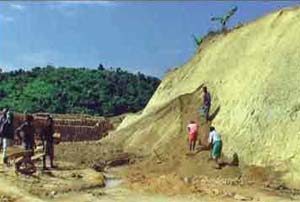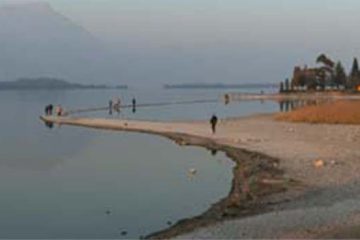Probir Kumar Sarker
 Though Bangladesh is prominently a plain land, its Chittagong, Cox’s Bazar, Rangamati, Khagrachhari, Bandarban and Sylhet have hilly areas with forests and rich biodiversity. These areas are full of natural resources fulfilling needs of the people and other living species.
Though Bangladesh is prominently a plain land, its Chittagong, Cox’s Bazar, Rangamati, Khagrachhari, Bandarban and Sylhet have hilly areas with forests and rich biodiversity. These areas are full of natural resources fulfilling needs of the people and other living species.
But at present, the destruction of hills in every area has become so alarming that many concerned people have been upbeat against the greedy grabbers who are out to convert these hilly areas into plain lands to set up industries and houses or just to steal soil.
Besides the individuals and private firms, government agencies are also involved in such suicidal activities. It is alarming because of the after effects, which the hill cutters do not take in consideration when they move ahead with their unconscionable acts.
Concerns are raised by the High Court, environmentalists and locals as the rate of razing hills has been increasing unabated. Lack of commitment of government high ups to address the issue sincerely and loopholes in law and its poor execution by law enforcers are the causes behind such poor state of the hills.
In a poor country like ours, natural resources like hills and woods are perhaps the most valuable raw materials as they are easily available, and in many cases free! But, why should we deliberately do such harm to our own resources to save or earn money, illegally?
Razing hills doesn’t only mean levelling the area and taking away the soil for other purpose, but the whole biodiversity is destroyed. Let’s leave aside the loss of natural beauty, hill cutting also accounts for soil pollution adding to the adverse impact on the environment.
And in more economic perspective, cutting down of hills minimises the tourism prospects we currently have in Sylhet, Cox’s Bazar, Chittagong and the three districts of Chittagong Hill Tracts (CHT).
The present grave scenario is witnessed more in Chittagong and Sylhet where industrialisation is growing rapidly, while in Cox’s Bazar the magnificent spot of tourist attraction hills are being levelled for construction of hotels-motels and other industrial and commercial establishments.
Because of comparatively stricter measures in place, hill cutting is seen less in the CHT. But still, because of massive arrival of Bengali settlers in the indigenous area, the region in near future may see similar detrimental impact. Presently, tree felling in the hills are taking place indiscriminately. The indigenous people, however, know how to use the hills for making huts and growing crops.
In Chittagong and CHT, where people live on the hill slopes, hill cutting increases chances of mudslides and threatens lives of dwellers. We’ve been experiencing numerous losses of lives for the past few years during monsoon triggered by rain.
How do these incidents happen when we have strict laws to protect the hills? It must be carelessness of the environment regulator officials, law enforcing agencies and the public representatives as well as the muscle and money power of the individuals and businessmen, for which the destruction of the environment continues.
The number of penalized people is so small that the violators are not afraid of anyone, and the group of dishonest people is ever expanding. The frustration mounts when we see the businesses linked to different government agencies cut the hills illegally and enjoy impunity, or face token fines, especially after their destructive activities are published in media.
According to a public statement, the Department of Environment (DoE) between January 2009 and June 2012 fined 20 institutions Tk 3.88 crore while filed 119 cases against people for cutting down hills illegally. But the number of incidents taking place was much higher as reported in media. Moreover, following negotiations with the regulator, the guilty can manage to pay less than what they were fined, and because of prolonged legal procedure and having scope for acquiring stay orders on the restrictions from the courts, many of them engage in the same crime again.
It is annoying as the government fails now and then to protect the hills when the High Court has repeatedly been ordering the government to ensure that no hills are razed without prior permission of the environment regulator.
While the government was supposed to raise its voice against illegal hill cutting and create awareness among the people to stand against this, we can see only the green groups and local people have so far spoken up.
Moreover, the court responded several times following the public interest litigations by environmental rights groups. But, execution of the orders by the government is not seen to be occurred.
It means the people linked with the government don’t want to go against the businessmen as they, allegedly, get benefits out of such ‘projects’.
But how long this can be allowed at the cost of environment? Very recently, a Bangla daily in an investigative report showed how the authorities of a proposed fertiliser factory were cutting down hills for their mega structure in Sylhet, without acquiring any environmental clearance from the regulator.
Locals and journalists came to know about the move and helped the countrymen know about the disaster through the newspaper. No government agency agreed to shoulder the responsibility even though it’s their duty to protect the natural topography.
The project is underway with finance from the governments of Bangladesh and China while a local contractor is conducting and supervising the land development. We’ve also come to know about the government’s constructing of roads and highways by razing hills.
So, how can we be in complacence following the court orders? How can we believe those sky-high claims by the government stalwarts that they are sincere in protecting the environment?
Yet we want to believe, that the government itself will fix the problems within it and then go for a massive plan to seal this trend of unplanned, unauthorised, and suicidal hill cutting forever. If measures are not taken up immediately, the concerns and frustrations will remain, and the nature will be losing its resources and balance, unfortunately, only to the detriment of most of our interest and benefit of a number of reckless profit mongers.
The writer is a journalist. He can be contacted through probirbidhan@gmail.com
Article originally published on The Daily Star





